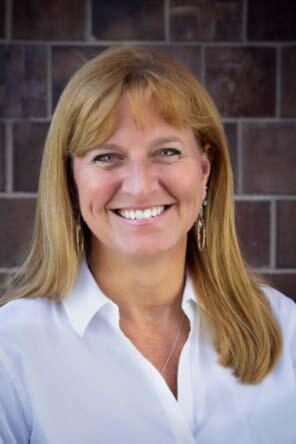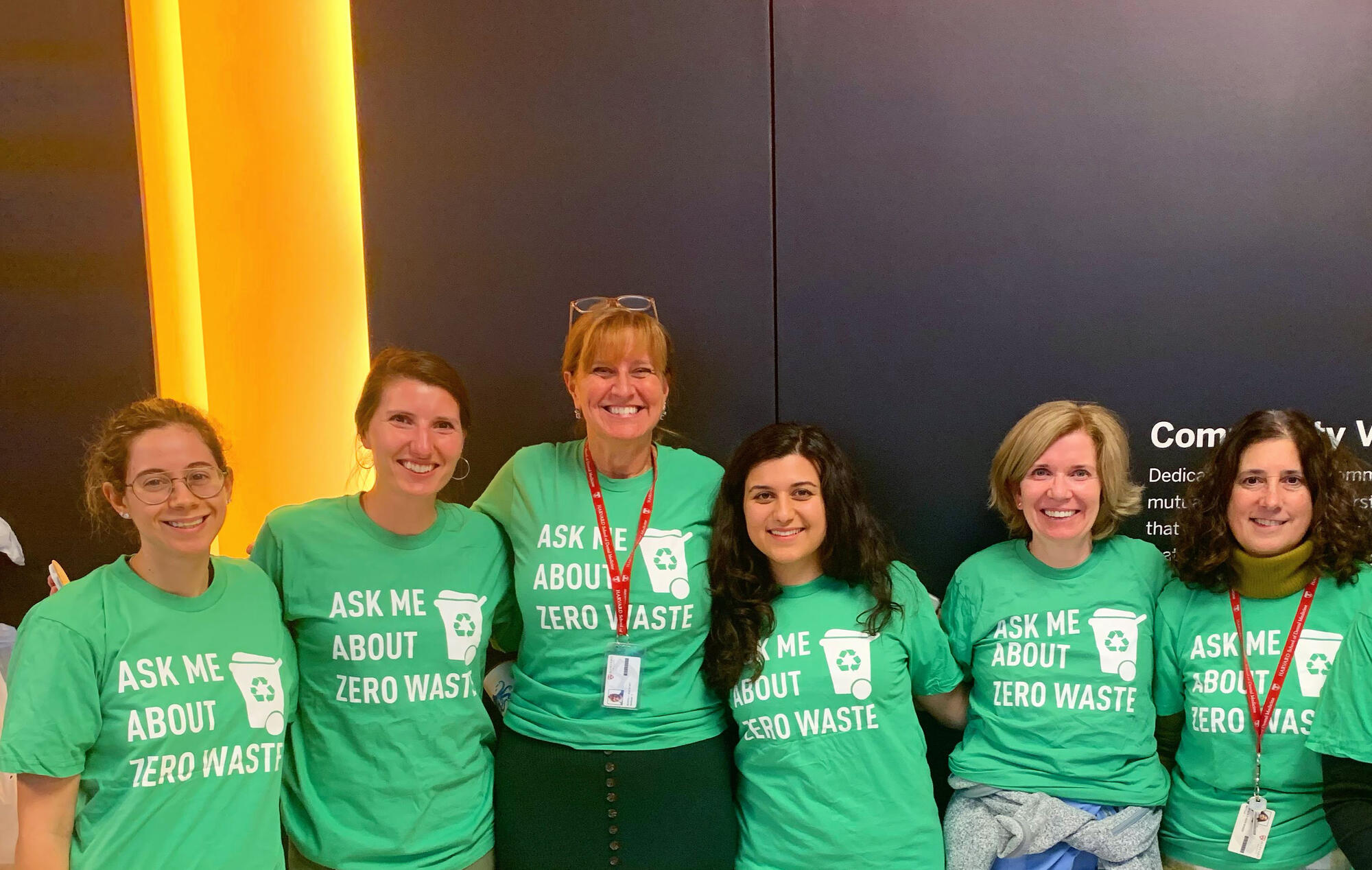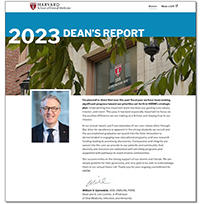
Dr. Donna Hackley is an instructor in Oral Health Policy and Epidemiology at Harvard School of Dental Medicine (HSDM). Her research encompasses environmental, oral health, and overall health. Hackley shares more about the sustainability work she is doing on a national and international level, and what HSDM is doing in the community in the following interview.
You were a contributor to the World Dental Federation’s recently issued Consensus Statement on Environmentally Sustainable Oral Healthcare. Could you broadly summarize the goals of the statement?
 By assembling a multi-disciplinary stakeholder coalition comprised of health professionals, industry, and legislative authorities, the FDI World Dental Federation’s Statement aims to elaborate on the challenges that we, as suppliers of dental products, interventions, and services, face in delivering sustainable oral healthcare, and offer strategies for mitigating harmful environmental impact. The Statement considers topics of waste management and reduction (including single-use plastics and personal protective equipment), environmental impact of dentistry, policies and guidelines, procurement, research and education, and materials. After considering the wide and complex array of activities and drivers of oral healthcare delivery, actions to mitigate adverse environmental impact are suggested. Ultimately, the goal is to develop a globally relevant, cross-sectoral Code of Good Practice to guide us all in the broader dental delivery supply chain toward sustainable practices and lifestyles.
By assembling a multi-disciplinary stakeholder coalition comprised of health professionals, industry, and legislative authorities, the FDI World Dental Federation’s Statement aims to elaborate on the challenges that we, as suppliers of dental products, interventions, and services, face in delivering sustainable oral healthcare, and offer strategies for mitigating harmful environmental impact. The Statement considers topics of waste management and reduction (including single-use plastics and personal protective equipment), environmental impact of dentistry, policies and guidelines, procurement, research and education, and materials. After considering the wide and complex array of activities and drivers of oral healthcare delivery, actions to mitigate adverse environmental impact are suggested. Ultimately, the goal is to develop a globally relevant, cross-sectoral Code of Good Practice to guide us all in the broader dental delivery supply chain toward sustainable practices and lifestyles.
How does climate change impact oral health?
This is a key question for which we do not have enough evidence base to respond definitively. Our colleagues in medicine are documenting health impacts due to climate change. For example, asthma rates have increased due to a rise in air pollution in the form of ozone and prolonged and intensified pollen seasons, both a result of increased average temperatures. As oral health professionals, we know that asthma and its treatments have potential to adversely impact oral health, specifically by increased caries risk. There are other possible pathways that oral health might be affected by climate change. Robust research to investigate potential associations is needed.
Regarding the practice of dentistry, climate change related severe weather events can devastate dental clinics. As catastrophic weather events such as fires and floods have increased, we face a future where it is possible that dental offices will be unable to see patients due to physical damage of their site (which can also include loss of patient records). It is also possible that patients in the community may be forced to evacuate their homes and become, in a way, migratory. Even if patients find a new provider, their records may not be available. It’s important for offices and clinics to engage in disaster preparedness plans that include concerns such as emergency escape procedures, patient and billing record protection, financial risk mitigation, and hazardous material risk reduction, among others.
What are some first steps dentists can take to be more sustainable in practicing dentistry?
 There are many informative and user-friendly resources to help dentists navigate the course of practicing sustainably. Key components include: 1) reducing our carbon footprint (energy, transportation, etc.); 2) selecting materials and supplies that are less harmful to the environment (such as single use plastics); 3) developing disaster preparedness plans; 4) living the mantra of ‘reduce, reuse, recycle’ regarding the dental as well as domestic waste we produce in our workspaces; 5) boosting oral disease prevention so that the need for restorative care is minimized; and 6) remembering that at the heart of climate change and health is the root cause of inequity. We can all work to reduce that disparity.
There are many informative and user-friendly resources to help dentists navigate the course of practicing sustainably. Key components include: 1) reducing our carbon footprint (energy, transportation, etc.); 2) selecting materials and supplies that are less harmful to the environment (such as single use plastics); 3) developing disaster preparedness plans; 4) living the mantra of ‘reduce, reuse, recycle’ regarding the dental as well as domestic waste we produce in our workspaces; 5) boosting oral disease prevention so that the need for restorative care is minimized; and 6) remembering that at the heart of climate change and health is the root cause of inequity. We can all work to reduce that disparity.
How can dental students get involved?
Dental students are the key! As I see it, this is the generation that will experience the greatest impact of climate change and the generation with the idealism and energy to make change happen. What concrete actions are possible?
- Participate. Join a sustainability committee, like ours at HSDM, and connect with groups from other schools.
- Reflect. It’s important to do some self-examination of each action we take throughout the day, at home or at school, that impacts the environment. Water? Plastics? Energy? Where can I improve?
- Learn more. Visiting reputable sites and reading up on the topics offers a base from where to design your actions.
- Take action. In Boston we have a variety of organizations raising the issue of the climate crisis and pushing for change. The concept of climate change and health is expanding rapidly. This is a great opportunity to make change happen.
What have we done at Harvard School of Dental Medicine to take action?
We have a very active, creative, and interdisciplinary Sustainability Committee here at HSDM with pre-and post-doctoral students, staff, and faculty members. All members of the community who are interested are welcome to join.
 Our research has included investigating dental students’ attitudes on sustainability, carbon footprint analysis, and waste audit. We’ve sponsored events to raise awareness such as Meatless Mondays, Take the Stairs, and Borrow a Mug. Actions taken by the committee include discontinuing the use of plastic “goodie bags” for patients who now take home their samples in HSDM labeled recyclable paper bags, providing recycling and composting bins throughout HSDM, installing solar-powered automatic sinks, shifting to reusable scrub caps, and installing energy-saving fume hood sensors.
Our research has included investigating dental students’ attitudes on sustainability, carbon footprint analysis, and waste audit. We’ve sponsored events to raise awareness such as Meatless Mondays, Take the Stairs, and Borrow a Mug. Actions taken by the committee include discontinuing the use of plastic “goodie bags” for patients who now take home their samples in HSDM labeled recyclable paper bags, providing recycling and composting bins throughout HSDM, installing solar-powered automatic sinks, shifting to reusable scrub caps, and installing energy-saving fume hood sensors.
This week, we will host an Earth Day Celebration on Friday April 22, 12 to 1:00pm in REB lobby. Come join us for food, fun, and fabulous announcements of our newest initiatives!


